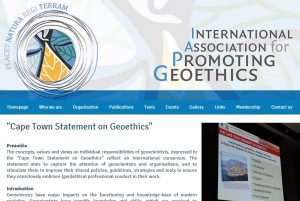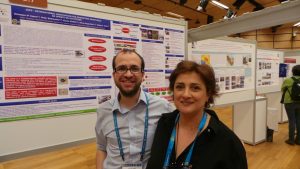 At the start of 2017, the GfGD Board of Trustees formally endorsed the ‘Cape Town Statement on Geoethics‘, joining organisations such as Geology in the Public Interest, the American Geophysical Union (AGU), and the Geological Society of America (GSA).
At the start of 2017, the GfGD Board of Trustees formally endorsed the ‘Cape Town Statement on Geoethics‘, joining organisations such as Geology in the Public Interest, the American Geophysical Union (AGU), and the Geological Society of America (GSA).
The ‘Cape Town Statement on Geoethics‘ was prepared during the 35th International Geological Congress in Cape Town, South Africa (27 August – 4 September 2016), and approved by the International Association for Promoting Geoethics Executive Council on 26th October 2016. Since then 11 major geoscience organisations have endorsed the Cape Town Statement, and we hope many more will follow. Here we outline our perspective on what geoethics means, introduce the Cape Town Statement, and discuss why GfGD decided to endorse the statement.
What is Geoethics?
The ‘Cape Town Statement’ defines geoethics as:
“Research and reflection on the values which underpin appropriate behaviours and practices, wherever human activities interact with the Earth system. Geoethics deals with the ethical, social and cultural implications of geoscience knowledge, education, research, practice and communication, and with the social role and responsibility of geoscientists in conducting their activities.”
Definition of Geoethics, Cape Town Statement on Geoethics
Ethics is the field of knowledge that deals with the principles that govern how people behave and conduct activities. Ethics is well established as being of relevance to other scientific disciplines (e.g., medical ethics, bioethics). Given the multiple interfaces of geoscience with society, it is appropriate that we all consider our social role and responsibilities – geoethics. This is not just a niche area of research, but extends to all geoscientists irrespective of their field (e.g., volcanology, engineering geology, hydrogeology, metamorphic petrology) and employment sector (e.g., industry, academia, public sector). Geoethics provides a framework for us all to reflect on the shared values that underpin our work as geoscientists, and how these values shape our professional actions, and our interactions with colleagues, society and the natural environment.

Fuego Volcano, Guatemala (Credit: Joel Gill. 2014)
Putting geoethics into the context of a few examples: (i) Overseas Research – consider what the responsibilities of geoscientists are when engaging in research overseas, how should we behave in a different culture, how do we interact with in-country researchers and institutions, and what responsibility do we have to share data and learning with these partners? (ii) Communication – consider the role of geoscientists in communicating our knowledge of a a geological feature, such as an active volcano, who should we directly communicate our research and monitoring data to, and what form should this communication take? And (iii) Data Generation – consider our shared values (within and beyond the geoscience community) in generating data that is reliable and can be replicated, what quality control measures can we put into place to ensure our science is rigorous and of the highest quality? All three of these examples could apply to the majority of geoscientists, albeit in different contexts. And all three require geoscientists to consider both professional and social values.
There are currently two international organisations focused on geoethics that are serving the geoscience community. The International Association for Promoting Geoethics (IAPG) and the International Association for Association for Geoethics (IAGETH). Their respective websites give further information on geoethics, including multiple resources of that may be of interest.
What is the Cape Town Statement on Geoethics (CTSG)?
“The concepts, values and views on individual responsibilities of geoscientists, expressed in the ‘Cape Town Statement on Geoethics’ reflect an international consensus. The statement aims to capture the attention of geoscientists and organisations, and to stimulate them to improve their shared policies, guidelines, strategies and tools to ensure they consciously embrace (geo)ethical professional conduct in their work.”
Preamble, Cape Town Statement on Geoethics
The CTSG includes a preamble, introduction, definition of geoethics, purpose, 10 fundamental values of geoethics, a proposed geoethical promise, and a final statement. Of most importance is the CTSG purpose, and the 10 fundamental values.
“Embracing geoethics is essential: to improve both the quality of professional work and the credibility of geoscientists, to foster excellence in geosciences, to assure sustainable benefits for communities, as well as to protect local and global environments; all with the aim of creating and maintaining the conditions for the healthy and prosperous development of future generations.”
Purpose, Cape Town Statement on Geoethics
As expressed in the CTSG, the purpose of this document is to foster excellence in the geosciences – in terms of our science, our societal interactions, and the legacy we leave for future generations. This is done by raising awareness of ‘geoethics’ as an important area of research and reflection – with the overall aim that all geoscientists will see geoethics integrated into their education and continued professional development. The ’10 fundamental values’ expressed in the CTSG help articulate what it is that we as geoscientists could (and should) be doing if our professional engagement with one another and society is to be considered ‘ethical’. For completeness of this article, we have noted these 10 values below, which should be read alongside the full CTSG.
• Honesty, integrity, transparency and reliability of the geoscientist, including strict adherence to scientific methods;
• Competence, including regular training and life-long learning;
• Sharing knowledge at all levels as a valuable activity, which implies communicating science and results, while taking into account intrinsic limitations such as probabilities and uncertainties;
• Verifying the sources of information and data, and applying objective, unbiased peer-review processes to technical and scientific publications;
• Working with a spirit of cooperation and reciprocity, which involves understanding and respect for different ideas and hypotheses;
• Respecting natural processes and phenomena, where possible, when planning and implementing interventions in the environment;
• Protecting geodiversity as an essential aspect of the development of life and biodiversity, cultural and social diversity, and the sustainable development of communities;
• Enhancing geoheritage, which brings together scientific and cultural factors that have intrinsic social and economic value, to strengthen the sense of belonging of people for their environment;
• Ensuring sustainability of economic and social activities in order to assure future generations’ supply of energy and other natural resources.
• Promoting geo-education and outreach for all, to further sustainable economic development, geohazard prevention and mitigation, environmental protection, and increased societal resilience and well-being.
Fundamental Values of Geoethics, Cape Town Statement on Geoethics
Why did GfGD endorse the Cape Town Statement on Geoethics?

IAPG session on Geoethics at EGU 2016: Silvia Peppoloni (Secretary General, International Association for Promoting Geoethics) and Joel Gill (Director, Geology for Global Development)
GfGD supports the values which underpin the Cape Town Statement on Geoethics. We believe it is the social and professional responsibility of all geoscientists to consider geoethics. GfGD is a champion of the Sustainable Development Goals (SDGs) within the geology community, and we recognise the Cape Town Statement as a helpful articulation of the values that are necessary to embed within the geoscience community if we are to make a full and positive contribution to the delivery of the SDGs. By endorsing the CTSG, when people ask us what are the values in the DNA of GfGD, we can point people to the CTSG. We then have our own responsibility as an organisation to outline how we have and will work these out in practice.
We congratulate IAPG on their commitment to serving the geoscience community. We are very pleased to see other organisations support the Cape Town Statement on Geoethics, and hope that many other professional societies, geoscience unions, and public/private sector organisations give this the serious consideration that it deserves.
